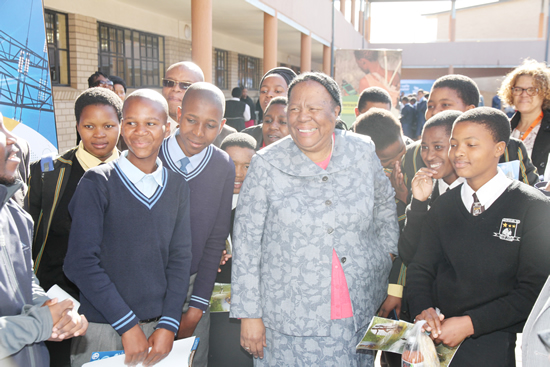Woman's Month
By celebrating women role models, the Department of Science and Technology hopes to inspire budding scientists, especially young girls, to choose the sciences as a career path.
 The Department of Science and Technology’s annual Women in Science Awards takes place in August. This year’s theme is Women’s Economic Empowerment in the Changing World of Work.
The Department of Science and Technology’s annual Women in Science Awards takes place in August. This year’s theme is Women’s Economic Empowerment in the Changing World of Work.
Since 2003 the awards have honoured the achievements of South African women scientists and researchers.
Minister Naledi Pandor – who recently received an honorary doctorate from NOVA University in Lisbon – understands the importance of role models. Her mother Fikile Matthews was one of the first African women to attend Fort Hare University to read science.
Innovation is a catalyst
Speaking at the Science Olympiad Awards early in July, the Minister spoke of the importance of science and technology.
Innovation alone, she reminded the young scientists, is not the answer, but it is a catalyst.
It fell to young people like the scientists being honoured, she said, to use their talents to find new ways to do things. “There are many exciting puzzles that young minds such as your own could play a role in resolving. For example, what should be done to encourage millions of young people to love and succeed in mathematics? You could help us find a solution to this.”
The Women in Science Awards are just one way the department is encouraging more women to choose a career in science. Fifty-five per cent of the department’s bursary funds and National Research Foundation funding has been set aside for women.
At the awards ceremony in 2014 the minister explained that women researchers and students were often side-lined because they found it difficult to access funds. “I want to make it easier for women to access funding, because I believe female scientists and researchers have much to contribute to our future.”
Award categories
1. Awards for Distinguished Woman Researchers
2. Awards for Distinguished Young Woman Researchers
3. Awards for Research and Innovation
4. DST Fellowships
- Four current master's students: Two in natural and engineering sciences, one in human and social sciences (HSS), and one in indigenous knowledge systems (IKS).
- Four current doctoral students: two in natural sciences, one in HSS, and one in IKS.
5. TATA Africa Scholarships for Women in Science, Engineering and Technology
- Three master's students in disciplines where the participation of women is low.
- Three doctoral students in disciplines where the participation of women is low.



 Facebook
Facebook Twitter
Twitter WhatsApp
WhatsApp